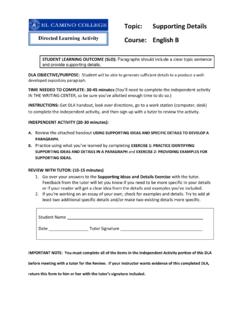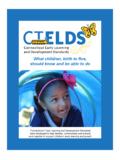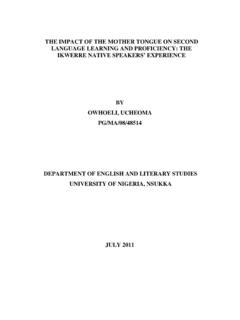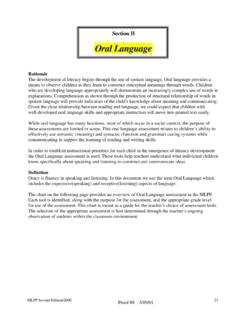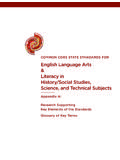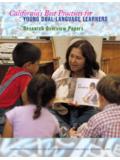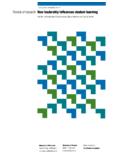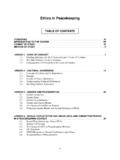Transcription of Research Proposal: Parental involvement and …
1 1 Enter Title Here Enter Date Here Research proposal : Parental involvement and engagement in their children s learning during the primary school years Request for Tender Closing date: on 5th May 2017 January 2017 2 3 Contents Introduction 4 National Parents Council Primary (NPCP) 4 NCCA resources and supports for parents 5 The proposed Research 6 Context: Building partnerships between parents and primary school 7 Importance of Parental involvement and engagement 7 Types of Parental involvement and engagement 9 Current information on Parental involvement and engagement in primary school education in Ireland 11 The Research project 13 Part One 13 National and international literature review on parent-school partnership: Parental involvement and engagement in their children s primary education 13 Part Two 16 Case studies of good practice in parent-school partnerships in primary education in Ireland ( children in primary education 4/5 to 12/13 years) 16 Structure of the final reports 20 The researcher(s) 20 Working with the NPCP 20 Publication of Research 21 References 24 How to tender 28 Contract 29 4 Introduction This document outlines the context for, and details of, Research on Parental 1 Section One provides the context for, and details of the proposed Research .
2 involvement and engagement in their children s learning during their primary school education. The Research is being commissioned by National Council for Curriculum and Assessment and the National Parents Council Primary. Section Two provides important information for those tendering for the Research , along with details of how to tender. Section One National Parents Council Primary (NPCP) The NPCP is the national representative organisation for parents of primary school children . NPCP s role is to ensure that parents voices are heard and to support and empower all parents through their Helpline, Training and Website. Full details of the organisation and its remit can be found on The NPCP is a member of the National Council for Curriculum and Assessment and its representative structures. The National Council for Curriculum and Assessment (NCCA) The NCCA advises the Minister for Education and Skills on curriculum and assessment for early childhood education and for primary and post-primary schools.
3 Full details of the organisation and its remit can be found on The NCCA is funding the Research on Parental involvement and engagement in their children s learning during their primary school education. 1 The term parent refers to the child s primary caregivers and educators. These include the mother and father and/or guardians. 5 NCCA resources and supports for parents The NCCA provides a range of resources to help parents in their important role in supporting their children s learning . Informed by, and building on Aistear: the Early Childhood Curriculum Framework (2009), the Primary School Curriculum (1999), and developments at junior and senior cycles, the NCCA has developed a range of online materials for parents and also to help settings/schools work with parents.
4 These include resources for parents of children in primary school: Information sheets for parents on the new language curriculum are available ( ) Tip sheets are available for parents on using play to support learning in seven different languages ( years). Tip sheets are also available on using books to promote discussion (3-6 years), supporting your child to become bilingual (birth to 6 years), helping your young child with maths, helping your child learn about measure, helping your young child to read and write (3-6 years). (See ) A booklet called Your child s learning : Guidelines for parents to the 1999 Primary School Curriculum (2000), which was distributed to all parents. (See ) The What, Why and How of children s learning in primary school (DVD) (2005), which was distributed to parents all over the country to help them learn more about the 1999 Primary Curriculum.
5 Companion information leaflets on each of the four two-year bands (junior and senior infants, first and second classes, third and fourth classes, fifth and sixth classes) are available on-line. (See ) Tip sheets for parents on how to help children with the maths curriculum for primary school are available in five languages. Twelve video clips showing how to support maths are also available. (See ) 6 Information sheets for parents on standardised tests, on school reports and on the Education Passport are available. The Education Passport is the suite of materials that is shared as a child moves from primary to post-primary school. It includes 6th Class Report Card2, My Profile sheet for children to fill in and My Child s Profile sheet for parents to complete. (See ) Ongoing work for the NCCA includes developing materials to support the important transition between pre-school and primary school, including a template that will provide information for parents and for teachers on children s learning and development as they make the transition.
6 Late 2015 saw the publication of the new Language Curriculum (English and Irish) for junior infants to second class. Work is ongoing on a language curriculum for third to sixth classes. A new mathematics curriculum is being developed beginning with the first four years of primary schooling. Education about Religious Beliefs (ERB) and Ethics curriculum is underway. NCCA is also providing advice on the time and structure of the primary curriculum following a consultation due to take place early in 2017. From an NCCA perspective, this is an ideal time to look more closely at how to support parents involvement and engagement in their children s primary education and has funded the NPCP to manage this Research . The proposed Research The NPCP is inviting tenders for two pieces of Research . Part One A review of national and international literature on parent-school partnerships that support involvement and engagement of parents in their children s learning during their primary school years.
7 This Research will provide direction for the NCCA and NPCP on how parents and schools can work in partnership to support children s holistic learning and development during the primary school years. 2 7 Part Two Case studies of good practice in parent-school partnerships in Ireland that support involvement and engagement of parents in their children s learning during their primary school years. Part Two will have two elements. Element one will look at what 4/5 schools, which are innovators in the area of partnership with parents in Ireland, are doing already. It will also look at whether and how the resources for parents developed by NCCA are being used by these schools. Element two of the Research will involve working with these schools as they help parents support their children s learning using the new language curriculum (English and Irish) for junior infants to second class.
8 It is envisaged that Part Two of the Research will commence around the time of the interim report on the literature review so that learning from it can inform the case study work. The two parts of the Research are outlined below in more detail. An individual researcher/group of researchers may tender for one or both parts of the Research . Context: Building partnerships between parents and primary school Importance of Parental involvement and engagement The Irish Constitution, in Article 42, acknowledges that the primary and natural educator of the child is the family and guarantees to respect the inalienable right and duty of parents to provide, according to their means, for the religious and moral, intellectual, physical and social education of their children . The home learning environment has a huge impact on children s lives. The importance of involving parents in their children s learning and development, particularly in the early years and at primary level, has been demonstrated over and over again in international and national Research .
9 Research reviews such as those by Desforges and Aboucaar (2003), Goodall and Vorhaus (2008) and others in the UK, Emerson, Fear, Fox and Sanders (2012) in Australia, and an OECD review of parent involvement in 14 countries conducted by Borgonovi and Montt (2012), all show that children do better when their parents are actively involved with their education. Parental involvement is taken to include the quality of parenting in the home as well as the extent of Parental contact with the early childhood setting or school. Parental involvement is greatly influenced by family social class, the mother's level of education, mental wellbeing and single parent status, poverty, and, to a lesser extent, by family ethnicity. The extent of Parental involvement diminishes as the child gets older, but 8 at all ages Parental involvement is important.
10 Parents of primary school children can engage with their children s school in different ways, although how they go about this may look slightly different as children get older and their needs and capabilities change (Desforges, 2003). The role of parents is even more significant when children need extra support for learning , as in the case of children with special educational needs, children with English as an additional language, children experiencing disadvantage. Parents also have an important role to play at times of transition when children move from home to the early childhood setting and from the pre-school/early childhood care and education (ECCE) setting to primary school and from primary to post-primary school. Parental involvement in education has been defined as parents' interactions with schools and with their children to promote academic success (Hill et al.)

